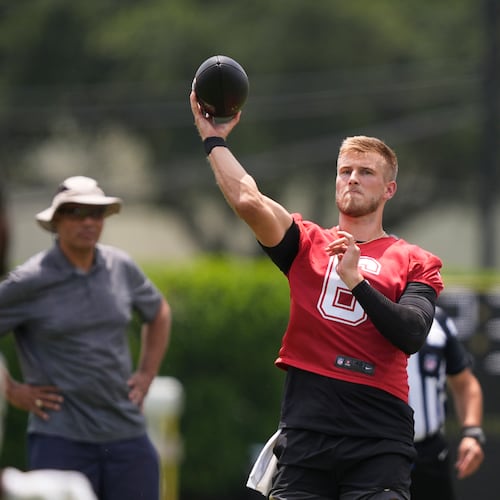It would be wrong to characterize the Falcons as mystery guests. They’ve been noticed. Attention has been paid. Still, the feeling on the ground here has been that they’re the Opponent. In the exhaustive run-up to this Super Bowl, the focus has fallen on New England.
The Patriots going for a fifth title this century. Bill Belichick going for No. 5 to pass Chuck Noll. Tom Brady going for No. 5 to pass Montana and Bradshaw, Tom Brady looking to close his Revenge Tour by taking the MVP trophy from a commissioner who has become the biggest Boston enemy since Bucky Dent. Pats every day, Pats all the time, Pats Pats Pats.
Which, if you’re the Falcons, is just dandy. They got here by being the team nobody saw coming. Even they weren’t sure what they had until deep into autumn. Many Falcons point to the November bye week as the time when the season assumed a higher plane. Dan Quinn, who coaches the team, points to week after the excruciating December loss to Kansas City on Eric Berry’s Pick-2 as “the first shift.”
He points to the postseason as another, and let’s be honest: Even if you believed the Falcons entered the playoffs with a chance to make some noise, they’ve exceeded expectations. They’ve crushed Seattle and Green Bay, two Brand Name teams. That they haven’t yet become a Brand Name themselves is no big deal. Win the Super Bowl, and it’s like that cozy bar — a Boston bar, if memory serves — of TV fame: You’ve arrived at the place where everybody knows your name.
The Falcons are underdogs, but only by three points. Far more media folks are picking the Pats than the Birds. Belichick and Brady are known commodities, maybe the best at their respective jobs the NFL has seen. But they’ve lost two Super Bowls, and the total margin of victory in their four victories has been 13 points. As good as they’ve been, they’ve never blown anybody out on this stage.
These Falcons lost five games by a total of 23 points. Their biggest loss was the nine-pointer in Philadelphia before the bye, and they led with seven minutes remaining. Even with a defense that ranks 27th in points yielded and 25th in yards against, they’ve had a chance in every game. Toward season’s end, the defense began to find its feet, which is why, with the exception of the K.C. loss and a New Year’s Day victory made cosmetically close when the Saints scored the final 19 points, they’ve blown people out since Thanksgiving. Come January, they were the NFC’s best team by some distance.
The Patriots are 16-2. They’re very good. But without Rob Gronkowski, the tight end who cannot be covered, they aren’t quite as imposing. New England’s offense moves on short passes that become long gains. The Falcons aren’t the greatest at defending the pass — they allowed a completion percentage of 64.4, 22nd-best in the league, and 267 yards per game, 28th-best — but they’re fast enough and hit hard enough to limit the Pats’ YAC (yards after catch).
Bill Walsh, who won three Super Bowls, famously said that the key to football was a pass rush late in the game. If either side musters much of one, it will be a surprise. The Falcons won’t sack Brady often — nobody does — but the Patriots probably won’t trouble Matt Ryan unduly. These teams are going to score. According to Football Outsiders’ DVOA — defense-adjusted value over average — ratings, the Falcons’ offense is No. 1 and the Patriots’ is No. 2.
Both sides will run the ball. If the Patriots run it well, the Falcons will lose: The raging offense is of little use if the other team controls the clock and finishes its drive. But the belief here is that the Falcons have been tested by their schedule in a way the Patriots have not. They’ve seen defenses — Denver’s, Arizona’s, Seattle’s — better than New England’s. The Patriots have seen only one quarterback on Ryan’s level, and that was Ben Roethlisberger in the AFC title game in Foxborough on a day when the Steelers lost running back Le’Veon Bell in the first quarter.
Belichick’s penchant for defusing great offenses by taking away the opponent’s most dangerous player could be rendered inoperative by the Falcons’ balance. If the Patriots double-team Julio Jones, they’ll have to deploy solo coverage against everybody else. As Belichick said this week: “You can’t stop one guy. They have too many weapons.”
In a game that figures to careen hither and yon, would you really want to pick against Ryan and Julio and Mohamed Sanu and Taylor Gabriel and Devonta Freeman and Tevin Coleman? This offense hasn’t been stopped, or even slowed, in a long time. For all the talk about Brady’s quest, these Falcons have played with a focused fury all season. They’ve come too far to stop now.
The Falcons’ history in such massive games is about the smallest of sample sizes, but this we know: The biggest victory in franchise history was achieved against a team that seemed unstoppable. But Gary Anderson missed his kick and Morten Andersen made his, and the 16-1 Vikings of 1998 were 16-2 and stuck in the frozen north while the Falcons headed to Miami for the Super Bowl.
The final score that day in the Metrodome was 30-27 in overtime. That will be the score here, though not in OT. The Falcons haven’t been the team driving the conversation. That will change when they’re holding the Lombardi Trophy.
About the Author
Keep Reading
The Latest
Featured



